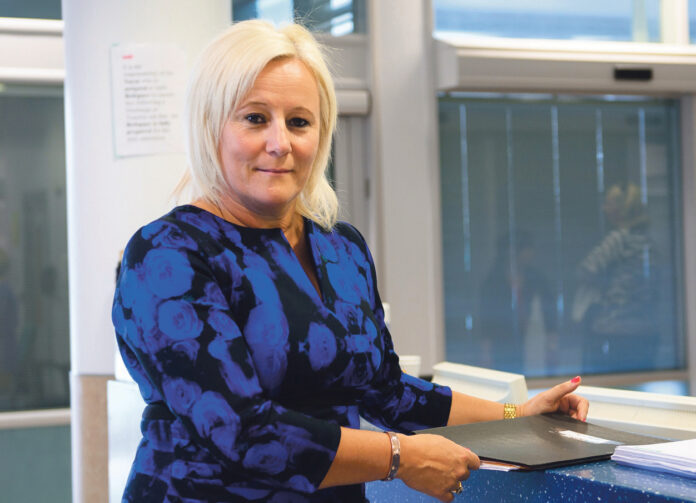
302 additional beds and a significant increase in medical, nursing and allied health staff are the major recommendations of an audit commissioned by University of Limerick Hospitals Group chief executive Colette Cowan into overcrowding at University Hospital Limerick (UHL).
The audit, which was compiled by consultancy group Deloitte, followed severe criticism of management at UHL after an inspection by the Health Information and Quality Authority (HIQA) raised serious concerns about patient safety at the main public hospital in the midwest.
HIQA said conditions at the emergency department at UHL were insufficient to meet the needs of patients and compromised the delivery of safe care.
HIQA published the report on the emergency department at UHL following an unannounced inspection on March 15 to assess preparations for the risk of additional severe overcrowding over the extended bank holiday weekend.
It concluded that the hospital was not planning, organising or managing nursing staff levels to ensure that high-quality, safe and reliable healthcare was provided.
It went on to describe how the hospital failed to comply with national standards governing patient dignity, patient care and staffing levels.
The inspectors stated that UHL was only partially compliant with guidelines for the effective management of services.
HIQA inspectors were not assured the hospital had adequate measures in place to address overcrowding, ineffective patient flow, insufficient nurse staffing levels and prolonged waiting times in the emergency department.
And they stated that measures enacted to try and tackle these problems had not been effective in managing risks to patient safety.
The inspectors found the emergency department to be “grossly overcrowded”, with many people experiencing lengthy delays.
One patient had been waiting on a trolley for 116 hours – almost five days. Another was waiting over 85 hours, while a third had been there for 71 hours, without treatment.
On the day of the inspection, there was a 17 per cent shortfall in the agreed number of nurses rostered on duty.
A HSE review panel established by the Minister for Health to investigate why UHL is so routinely overcrowded and to provide supports to the hospital, commenced its scrutiny of the hospital last May.
The audit published by Deloitte earlier today, recommended “increases in medical, nursing and allied health staff at University Hospital Limerick (UHL) and across the group of six hospitals; the implementation of a range of admissions avoidance initiatives and greater integration with community services in line with Slaintecare.”
Deloitte’s findings are based on detailed analysis of UL Hospitals Group data, from 2019 to 2022, and projected demand out to 2036 as a consultation with 25 stakeholder groups across acute and community services in the mid west region.
Deloitte’s recommendations, which are in line with a three-year HSE care improvement plan, include:
· An additional 302 inpatient beds required by 2036 to meet current unmet demand, future demand and to replace outdated infrastructure in multi-occupancy nightingale wards
· An additional 63 day beds by 2036
· Additional medical (consultant and NCHD) and nursing staff in the Emergency Department are an immediate priority
· Additional medical staff to extend the operating hours of the Acute Medical Unit at UHL
· Address significant deficits in health and social care professionals on wards across the Group to facilitate admissions avoidance, earlier discharges and development of integrated care pathways
· Upgrade the eHealth systems across the hospital and community to a fit-for-purpose single electronic healthcare record
The audit describes a “significant growth in demand” at the UHL emergency department UHL with 76,473 attendances in 2021.
Deloitte’s analysis of hospital group catchments across the country showed ULHG to have the “fewest inpatient beds per 1,000 population as well as the “lowest consultant, NCHD, nursing and HSCP staffing levels per capita”.
It said that outdated multi-occupancy inpatient wards, accounting for 199 of the current 530 inpatient beds at UHL, cause significant additional challenges on infection control and patient flow.
The audit also highlighted how the demographic and socioeconomic factors in the region – which are driving increased demand on hospital services – include a higher proportion of older and disabled patients in the population; a higher frailty index and a higher social deprivation index.
Responding to Deloitte’s findings, Professor Cowan said ULHG had experienced significant and growing demand for unscheduled care, particularly over the last 18 months, which “contributed to long wait times for patients and the curtailment of scheduled care for many patients whose treatment had already been delayed because of the pandemic”.
“The key findings of the report underline how we have been managing record demand for our services, from a population with greater health needs, with fewer beds and fewer staff per head of population.
“It is important that I recognise the additional support that we have received from government and the HSE, with the addition of 98 new inpatient beds at UHL since the start of the pandemic and over 900 additional staff so far this year,” she added.
“Work will commence next month on a new 96-bed block for UHL. More work is needed, however, for us to catch up with other regions and to plan to meet the demands from a growing and rapidly ageing population.”
Prof Cowan said ULHG “must also plan to increase capacity for scheduled care”, and said the Deloitte report cleary set out how “emergency demand is adversely affecting patients on waiting lists” in the region.
She said the report “has projected an additional 63 day beds are required by 2036 and we must also add capacity for elective inpatients – which strengthens the case for an elective hospital in the mid west.”
Meanwhile, the general secretary of the Irish Nurses and Midwives Organisation (INMO), Phil Ni Sheaghdha warned of a “catastrophic winter ahead in our hospitals” as it published figures showing 10,515 patients languished on trolleys in hospitals nationwide throughout September.
UHL was the most overcrowded hospital with (1,382) patients on trolleys during September, followed by Cork University Hospital (1,260), University Hospital Galway (790), and Letterkenny University Hospital (666).










